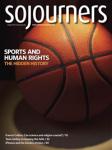My life has taken me from a childhood in the burning Bronx to the Arctic Circle, through ghettos large and small, and to places I didn’t even know existed until I was well into my adulthood.
All those experiences—for which I am very grateful—are not just enlightening for me as a person. Collectively, these experiences become a responsibility that I am happily obligated to carry into as many places as I can. Halls of both power and powerlessness benefit from the exchange in ways that I hope will lead to world peace.
Really, I actually believe world peace is tied up in environmental equality for everyone. It’s not going to solve all our environmental or our equality problems overnight, but it is a cornerstone toward building the kind of world I know we can achieve.
I often find myself working with academics, scientists, and other leaders on climate change mitigation issues. And often I find myself occupying the “diversity” (I’m black) or “equity” (I’m not rich) track in such forums.
It’s great that more and more people in positions of influence are now agreed that these are important aspects to be included in more and more places. The next step is realizing that putting these issues into silos is tantamount to keeping them in an intellectual ghetto.
If we insert the argument for equality in every important discussion, we will benefit in many ways. So I often put forth a small questionnaire of yes-no questions to leading scientists from around the U.S. with whom I collaborate. It looks like this:
1. Do you believe that some people should breathe dirtier air than others?
2. Do you believe that some people should drink contaminated water?
3. Do you believe environmental burdens are equally distributed throughout the U.S. population?
4. Do you believe that if energy, transportation, agriculture, and waste infrastructure was sited near affluent people as easily as it is sited near poor people, it would look like it does today?
5. Do you believe environmental burdens affect poor people more than affluent ones?
I wrote the first few questions in a way that anyone could easily say “no” to them. But the responses I’ve received have become a lesson I find myself learning again and again—don’t assume anything, ever. Many people meet the questions head on, in an almost adversarial way. They believe it is important to determine the specifications on what types of “contamination” is involved, or the definition of “dirtier air.”
What this tells me is that we don’t have to work just on our arguments or our information. No matter how solid an argument, people need to be mentally, emotionally, and spiritually prepared to open their world to the light of equality before it can be included.
Great struggles and movements have equality at their core, not some strategy of accommodation over time. The American Revolution was a struggle for equality among men; abolitionists fought to end slavery on the basis of the equality that the founding fathers established. Achieving voting rights for blacks and women was a huge struggle based in equality.
When we put the word “equality” down in writing and agree to its worth, as the framers of our Constitution did, it’s like planting the seed of a giant redwood. It grows from the page, outlives its authors, and becomes something greater than what one could have imagined when it was written.
Without equality at the core of our work, we will never address the challenges we face in the environmental issues of our time. If we place the environmental equality of all our people as paramount, we shine a light on the path to victory.
Majora Carter, founder of Sustainable South Bronx and a MacArthur “genius grant” recipient, is president of the Majora Carter Group, an economic consulting firm.

Got something to say about what you're reading? We value your feedback!